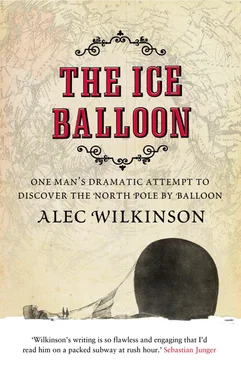He practiced a precautionary discipline he called self-hypnosis. Someone whose will was strong, he believed, was always liable to coming under its thrall, and “it is therefore essential to direct one’s will through daily training towards that which one, through judgment and experience, has found to be sensible and therefore beneficial.
“One masters oneself in the same way one masters others:” he wrote, “by cultivating a keen conception of how one should and should not act.” His “cold blooded calmness and realism,” wrote a friend, “were not based on a cold temperament, but on his incessant exercise of self-control.”
He had no ear for music or writing, or any eye for art. In the portrait of him published in The Andrée Diaries, the 1930 account of the voyage and the discovery of the remains, this indifference is described as amounting nearly to “a defect in his character.” Friends who persuaded him to go to the opera or an art exhibition “had every reason to repent of their success, for he always managed to spoil their own pleasure by his remarks and criticisms.” The writer doesn’t mention what those criticisms were, but they were apparently uninformed. When the novelist Selma Lagerlöf was given a prize, Andrée was invited to a dinner in her honor where he was asked if he had read her book, and he said, “No, but I have read Baron Münchhausen”—the German fabulist who had said that he had been to the moon—“and I suppose that it is all the same.” An oaf in cultured company is what he sounds like sometimes, but perhaps he was only trying to deflate manners he regarded as pretentious. As for nature, “he displayed a highly developed sense of beauty, and during his many balloon journeys he greatly enjoyed the magnificent scenery.”
He seemed to have a kind of intelligence that saw patterns in forms that other people found chaotic, and to be able to hold complicated structures and solutions in his head. He cared deeply about how things went together and how they worked and whether their design was efficient. According to The Andrée Diaries, once he decided on an end he did everything he could to attain it. Even so, “no one could weigh every consequence more ruthlessly, more critically than he. He never acted spontaneously, and there was wanting in him the spirit of fresh, impulsive action, but this was compensated for by the sense of security which is conveyed by the actions of an assured, discriminating man. He embodied, in every respect, the ancient phrase: ‘To speak once and stand by one’s word is better than to speak a hundred times.’”
Andrée appears to have been one of those people whose attitudes and habits of mind are literal and firmly formed, so that moving among disciplines is not a matter of broadening oneself by means of new terms so much as applying one’s customary judgments to new circumstances. Such a temperament seeks to encounter the familiar and to assess it or deplore its absence, rather than be influenced and possibly enlarged by what it doesn’t recognize. It is a commanding, not a humble, state of mind, restless rather than engaged, and capacious more than penetrating. An advantage of it is the capacity to interest oneself in a mulitiplicity of subjects and to arrive quickly at personally satisfying determinations. Andrée’s interests were wide-ranging. According to the portrait, he made notes for papers on the influence of new inventions on “every branch of human activity,” from “the general development of mankind” to “language, architecture, military science, the home, marriage, education, etc.” He wrote about scientific topics, in papers such as “Conductivity of Heat in Construction Material” and “Electricity of the Air and Terrestrial Magnetism.” He wrote about social phenomena in others such as “The Education of Girls,” and “Bad Times and Their Causes,” and about miscellaneous topics such as “The Importance of Inventions and Industry for the Development of Language,” and “Directives and Advice for Inventors.” He appeared to feel that nothing that interested him was beyond his ability to have an opinion about it.
Once Andrée was grown, the only woman for whom he felt a strong attachment was his mother. “Her rich natural endowments, in which good judgment and sharp intellect dominate such characteristics as are commonly called feminine in this day and time, her remarkable will power and capacity for work, as well as her ability to endure and suffer, remind us of the old Norse women,” he wrote in a notebook. “Despite her seventy-five years she does not seem old. Her face has few wrinkles. It seems to belong rather to a woman of sixty. The impression of power still unshaken is heightened by her voice which lacks the sentimental, pleading tone one so often finds in older women. Her voice harmonizes with her exterior: firm, strong, almost gruff, but with an undertone of kindliness.”
A monument, in other words, erected by a child and tended into adult life—which must have been fatiguing. When Andrée felt himself drawn to a woman, what he called the “‘heart leaves’ sprouting, I resolutely pull them up by the roots,” he wrote. The consequence was that he was “regarded as a man without romantic feelings. But I know that if I once let such a feeling live, it would become so strong that I dare not give in to it.” An acquaintance wrote in a letter that Andrée appeared to have remained a bachelor for the sake of his mother, and for a while they lived with each other. When Andrée was asked why he had never married, he said of any woman who would be his wife that he would not “risk having her ask me with tears in her eyes to abstain from my flights, and at that instant, my affection for her, no matter how strong, would be so dead that nothing could ever bring it back to life.”
Figures from history occasionally rise up from the page as if they had merely been waiting, sometimes impatiently, for someone to speak to them. Andrée comes to life a little resentfully, as if interrupted. Through his devotion to his mother he may have been restricted emotionally from mature relationships with women. It is also possible that he was indifferent to showing, or incapable of expressing, any true warmth to another person, except in the narcissistic fashion of a child. His great mechanical abilities and inclinations toward solitude suggest a temperament that does not effortlessly engage in conventional exchanges, one that might easily be confused or defeated or embittered, and might find objects and tasks more agreeable than people. Not all of us want the same things from life. The mainstream forces its preferences on the minority, partly to sustain those preferences, but that doesn’t necessarily lend them any substance. Nowhere in Andrée’s writings or in the descriptions of him is there an indication of any but a cold-blooded sort of introspection, a capacity for assessing the success or failure of objects and tactics. The territory of feelings seems not to have been hospitable to him.
The only relationship with a woman that Andrée was known to have conducted was an affair with a woman named Gurli Linder, who became in the early twentieth century an admired critic of children’s literature. (Linder wrote the portrait of Andrée in The Andrée Diaries.) The affair, which occupied the last few years before he left—Linder in her brief writings on the matter says 1894 was their best and most untroubled year—was conducted so openly that Linder’s husband, a professor, asked her to behave with more restraint lest she embarrass him among their friends.
In 1875 an Arctic explorer named Karl Weyprecht, who was from Austria-Hungary, suggested that a series of polar outposts be established by various countries so that science could be done and the results of it shared. Weyprecht felt that polar exploration had become glamorized by its rigors and heroes, and by the pursuit of the unknown at the expense of the intellectual work it might better be doing. Weyprecht’s plan led, in 1882, to the International Polar Year, in which eleven nations established fourteen outposts, twelve in the Arctic and two in Antarctica. Sweden’s outpost was on Spitsbergen. It was overseen by Nils Eckholm, a meteorologist, and, on the recommendation of Professor Dahlander, Andrée’s physics professor, it included Andrée, one of whose tasks was to use a device called a portable electrometer to make notations concerning electricity in the air. The delegation arrived in July of 1882. Andrée was second in command.
Читать дальше












